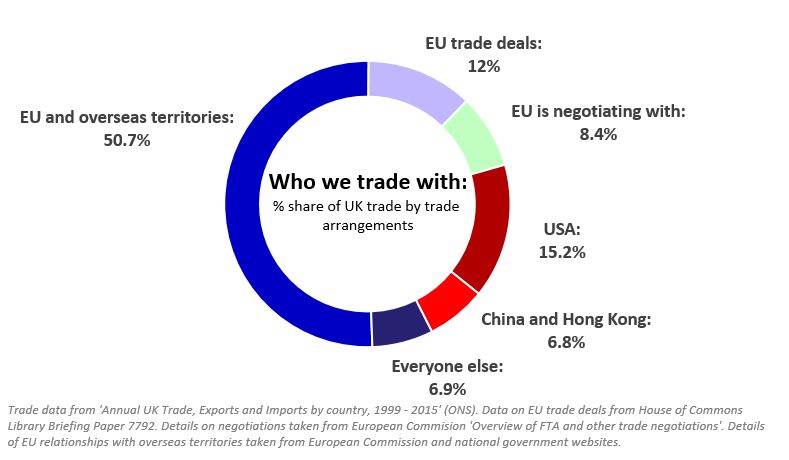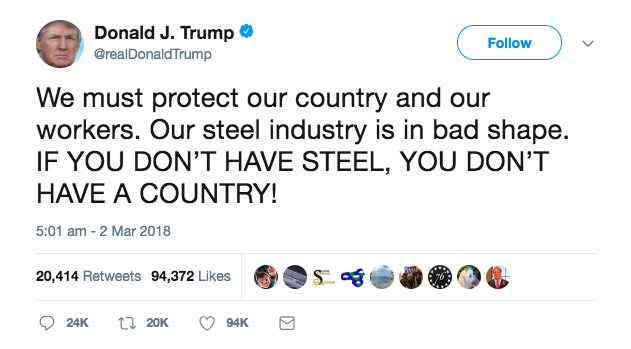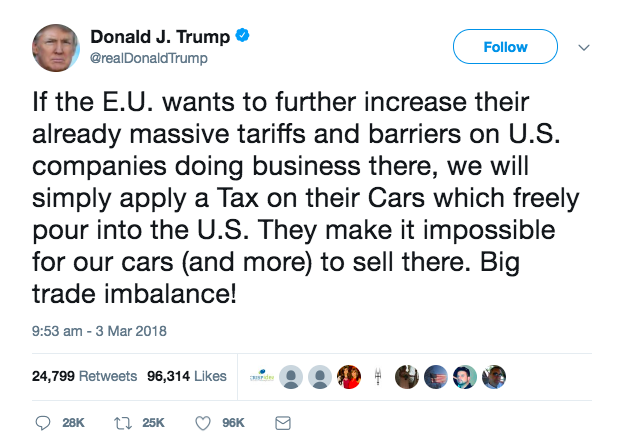Donald Trump’s latest tweets are a wake-up call for Brits still dreaming of the “glorious joys of free trade”, as Liam Fox used to say. If the UK is to forge a trade policy independent of the EU, the manifest priorities are the US and China. The rest of the world is either already in free trade with the EU, or in negotiation with it (India and Brazil), or of trivial importance nowadays for the UK.

So back to America. Trump’s first move last week was to slap on a 25% steel tariff and a 10% aluminium tariff on national security grounds, applied to the whole of the world, including even its closest and deepest free trade partner Canada. So the chance that post-Brexit Britain would hypothetically have got preferential treatment is close to zero.

When the EU indicated that it is preparing countervailing measures, if the US indeed goes ahead with these measures, Trump tweeted that the EU would face sanctions against its motorcar imports from the EU.

This is gross would-be bullying. But it may not work, since the EU and other major trade players could further retaliate with force that would hurt the US badly. The EU is an equal trade power to the US. The UK on its own would have no such power.
Brexiters also need to understand that trade negotiators are very loath to do sweetheart deals with close friends, because that creates precedents which can undermine more difficult negotiations with more important partners. It is enough to mention the dreaded chlorinated chicken that popped up in Liam Fox’s visit to Washington last year, to remember that negotiations over the terms of agri-food trade would also face brutal lobbying pressures on the US negotiator, even before factoring Trump into the equation.
How about China? The EU does not propose a free trade agreement with Beijing, since China’s state-owned enterprises are hugely important and do not operate on normal market rules. In addition, Beijing has never made a meaningful services agreement with a major world player. Brexiters should consult the remains of the UK’s steel industry on how they would fare, given that Chinese excess capacity in steel is a hundred times more than the UK’s total capacity.
Brexit doesn’t pave the way for the glorious joys of free trade. It sets us up to be bullied by the big boys. Trump’s tweets tell us why.
Edited by Hugo Dixon


What a pile of lies
Project fear is becoming Project stupid
DEMOCRATIC REFERENDUM 17.4 million
The concept of gaining trade deals and increased trade elsewhere would be centred on the USA. No other country has remotely enough wealth times population to be able to make a difference. Fox is a member of an Atlanticist business organisation which encourages USA take over of UK companies.
Of course, the USA has the idea of using political bullying and getting out of existing trade deals in order to try to protect home industries. It is the worst possible tome to be going on a phony search for free trade outside of Europe, as other countries put up tit for tat reactions. generally.
Once USA is in free direct competition with the UK, how could it not often beat UK industries with it’s huge space and cheap buildings, low cost domestic energy and huge single language home market of 320m, plus 120m more in neighbouring NAFTA countries. That is before you examine the low standards and lower overheads from workers rights, food or pollution.
Once the UK aligns it’s standards and some laws with the USA in a TTIP type deal, the USA take overs of UK companies would increase with larger USA companies taking over UK companies and closing down their productive aspects, to turn them into warehousing to receive cheaper American goods. A similar process happened when Canada took over the independent and poor Newfoundland and Labrador, in 1949.
USA companies have a vast reserve of offshore cash waiting to invest, which is untaxed in USA.
With the exception of China, none of the BRICS countries offer more than a crumb of comfort for British exporters. Donnelly was correct about exchanging a three course meal now for a packet of Crisps later. It is on that scale.
Even China, with it’s 300m middle classes, is competitive enough to send Tesco packing and if the UK’s biggest retailer failed, what chance for most smaller companies? Chinese firms continually rip off copyright and patents and copy unprotected goods as their standard model, while western investors have been burnt off in thousands.
In the EU we retain high standards and we can compete with similar countries as well as take advantage of their rich markets with similar cultures and tastes. The costs of doing business are also much lower there because of geography.